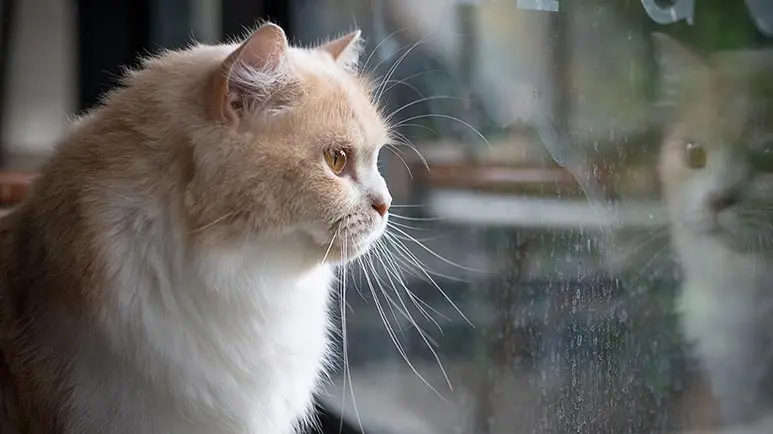Is Your Cat Struggling with Separation Anxiety?
If you think that leaving your cat alone for a few hours will not affect them whatsoever, it could be you’re just missing the signs. Here’s how to tell if your cat is dealing with separation anxiety (and what you can do about it).

STORY AT-A-GLANCE
- Separation anxiety in cats can manifest through various signs, including excessive vocalization, pacing, changes in eating habits, overgrooming, inappropriate elimination, destructive behavior, escape attempts and overly excited greetings upon the owner's return
- Certain factors may predispose cats to separation anxiety, such as being orphaned, weaned too early, rewarded for clingy behavior, living in unstimulating environments, or experiencing significant life changes like vacations or changes in their owner's schedule
- To help cats with separation anxiety, it's important to rule out medical issues first. Then, focus on building confidence through daily interactive play, keeping departures casual, and creating a calming environment with soft music, pheromone diffusers, or appropriate herbal remedies
- Natural remedies for feline separation anxiety include playing calming music, using pheromone diffusers, applying flower essences, diffusing essential oils like lavender or chamomile, and considering herbal remedies such as valerian or hemp CBD under veterinary guidance
Did you know that some kitties become anxious whenever their human companions leave the house? Despite appearing less sociable and more independent than dogs, our feline family members also develop a deep bond with their humans. While they may seem aloof and quiet, they could be silently struggling with separation anxiety every time you step out and leave them at home.
Cats Can Bond and Become Attached to Their Humans
While cats can have different personalities, studies have found that most cats bond and become overly attached to their humans. For example, a 2019 study,1 conducted by researchers from Oregon State University, found that cats bond in a way that’s similar to how infants bond with caregivers. And this doesn’t occur during kittenhood — it can continue well into their adult years.
The researchers used the Secure Base Test (SBT), a strange situation test, to observe the behavior of adult cats and kittens (aged 3 to 8 months). The cats and kittens were placed in an unfamiliar room with their caregiver for two minutes, followed by two minutes alone. Afterward, they were reunited with their caregivers for two minutes.
The cats' responses to being reunited with their caregivers were classified as either secure or insecure; they found that 65% of both cats and kitties are securely bonded to their caregiver. Kristyn Vitale, one of the study authors, said:2
"Like dogs, cats display social flexibility in regard to their attachments with humans. The majority of cats are securely attached to their owner and use them as a source of security in a novel environment."
So, if cats can indeed bond closely with their humans, then it only makes sense that they experience separation anxiety as well. This is a stress response that occurs in situations when an animal is apart from people or other animals that they are attached to. There are some cats who are more prone to separation anxiety, though, such as those that were:3
- Orphaned
- Weaned too early
- Being rewarded by their humans for their clingy, needy behavior
- Living in environments that do not offer a variety of activities that build confidence
- Subjected to a particular event that triggered separation anxiety (example: a vacation, change in work schedule or even a divorce or separation)
Eight Signs of Separation Anxiety in Cats
One common sign that a cat is having separation anxiety is when they’re trailing you from one room to another, all throughout your house — even though you’re not carrying her food bowl or any treats. Some cats may also display what’s called “pre-departure anxiety.” This means your cat meows, sulks, slinks away, hides or appears depressed when you’re getting ready to leave. Catster lists4 eight signs of separation anxiety in cats, which include:
- Increased vocalization — Incessant meowing, crying or yowling when you leave the room or house. Listen outside the door to check if the crying stops after you’re out of their sight; if they continue meowing, then this is a sign of separation anxiety.
- Pacing or circling — If you’re getting ready to leave, your cat may seem restless, walking around and circling the room. They may do this before you leave and after you get home.
- Changes in eating habits — Some cats refuse to eat when you’re not home, and only do so when you return. Others gobble up their food to quickly before you leave. In both cases, it can cause them to regurgitate their food.
- Overgrooming — Excessive grooming can mean that the cat is trying to self-soothe. Signs of overgrooming include the appearance of bald spots in their coat, particularly on their lower legs or belly.
- Peeing outside the litter box — Cats that are upset can involuntarily urinate on your floor, the bed, the couch and other furniture when you’re not around. Some also vomit or poop all over the house.
- Destructive behavior — Knocking things off counters and tables, clawing furniture and chewing items around the house while you’re not around are signs of separation anxiety.
- Attempting to escape — Your cat may try to bolt out as soon as you open the door or may end up scratching the window, blinds, curtains, windows or doors. This can be particularly dangerous, especially if you live near busy streets or in a high-rise apartment.
- Appearing overly excited when you return home — They’ll be so happy to see you that they’ll jump on you, weave between your legs or vocalize excessively. They will also stay by your side for a while.
Helping a Cat with Separation Anxiety
Remember that some signs of separation anxiety in cats may not be just a behavior issue; they could be indications of a medical problem, too. For example, some cats pee or poop outside the litterbox even though they are not left alone at home. Excessive grooming or changes in eating habits can also indicate medical problems.
It’s best to take your cat to the vet for a wellness visit just to rule out any health issues. Once your vet has confirmed that all is well with your kitty, you can then make changes to their lifestyle or environment.
One thing to remember is to inspire confidence in your cat. Spend time with them daily through interactive play sessions.
How you greet and say goodbye to your cat matters, too. Don’t overdo the goodbye process, especially if you’ll only be gone for a few hours. Just keep it casual. Other helpful ways to help ease your anxious cat include:
- Play calming music — Cats hate loud music; play white noise or soft classical music instead to provide a calming distraction.
- Diffuse pheromones — Pheromones can help affect your cat’s emotional state and behavior.
- Try flower essences — They are safe to use topically on cats or added to their water.
- Use essential oils — Add lavender, German chamomile, ylang ylang, clary sage or frankincense to a water diffuser or use a hydrosol.
- Try herbal remedies — Valerian, hemp CBD, ashwagandha, chamomile and holy basil are herbal remedies with calming properties. Consult with your integrative vet for helpful remedies and the ideal dosage for your kitty.











